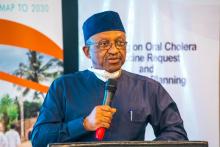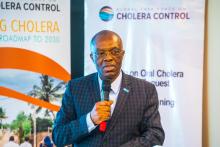WHO facilitates training of health workers on Oral Cholera vaccines for preparedness against cholera outbreaks x
Abuja, 26 April, 2022 - The World Health Organization (WHO) has kicked off a five-day workshop on 25 April 2002 in Abuja for public health officials to strengthen the capacities to integrate oral cholera vaccination (OCV) into the emergency and preventive measures in some Anglophone Cholera Priority countries in Africa.
With participants from six countries - Ethiopia, Kenya, Mozambique, South Sudan, Uganda and the host country, Nigeria – the training aligns with ‘Ending Cholera: A Global Road Map to 2030; and is intended for individuals that will be involved in the planning and implementation of OCV campaigns.
Speaking at the opening of the hybrid (online and physical) training, Nigeria’s Minister of Health, Dr Osagie Ehanire, said the training is a welcome development as a prelude to equitable access to the OCV vaccine and another step towards the goal of better health for all.
Dr Ehanire, while appreciating WHO for the initiative, implored participants to make the best use of the opportunity and put in their best to acquire the knowledge and skills necessary to use the vaccine to eliminate cholera as a recurrent health problem in Africa.
The minister said that while traditional measures for cholera prevention and control have been to provide potable water and improve hygiene and sanitation, science has, however, over the years, risen to the task, with the development of the oral cholera vaccine, now certified as effective enough to be recommended for disease prevention and control
“I commend WHO for this laudable and desirable initiative, a tool for prevention and control of cholera outbreaks, which has for some time now, become a recurrent seasonal public health challenge in many Low and lower-middle-income countries, like ours, despite efforts to control it, he said.
In his remark, the WHO Country Representative, Dr Walter Kazadi Mulombo, said that the training provides the opportunity for knowledge sharing among organizations and the multiple country participants.
According to him, WHO is cognizant of the need to implement quality campaigns and the operational challenges in different contexts. Working in line with the preparedness for future campaigns, the recently approved GTFCC application for Nigeria with approximately 9million doses of OCV to implement two campaigns in 14 LGAs in 9 states, including the Federal Capital Territory, would significantly mitigate the risk of an upsurge of cholera cases during this raining season.
“We believe that the vast experience built-in Nigeria over the years in implementing mass vaccination campaigns will come to bear, as we prepare for these preventive campaigns.
Who looks forward to the outputs of this training and assure you of WHO Nigeria’s support to the Government of Nigeria in implementing the NCP (when finalized), including ensuring quality vaccination campaigns while also monitoring and evaluating the implementation of this plan”, he said.
Training objective
The WHO OCV focal point, Malika Bouhenia highlighted the delays in implementation of vaccination campaigns which have been identified to be due to capacity gaps in countries, adequate Human resources and knowledge around what mechanisms to access the vaccines. This training was planned to try to address some of these gaps across all endemic countries.
Meanwhile, Vincent Sodjinou Dossou, WHO Africa Region, said the of the training is to improve on the gaps identified during the 2021 annual Global Task Force on Cholera Control (GTFCC) stakeholder meeting.
He noted that it would enable countries to be better prepared to request, plan and implement quality campaigns with OCV as part of their national Cholera control plans and further contribute to the long-term goal of Ending Cholera by 2030.
Historically, WHO African Region Member States, including Nigeria, have experienced several cholera outbreaks characterized by high case fatality rates and vaccination against cholera is increasingly used as additional control measures for the prevention and the control of cholera outbreaks since 2013.
Participating countries at the end of this training will be expected to be better equipped to prepare ICG requests for oral cholera vaccines as well as GTFCC applications for preventive oral cholera vaccines.
The Global Task Force on Cholera Control (GTFCC) is a global network of organizations that brings together partners involved in the fight against cholera across all sectors, offering an effective country-driven platform that promotes a multi-sectoral, well-coordinated approach.
Technical Contact:
Dr Terna Nomhwange; Email: nomhwanget [at] who.int (nomhwanget[at]who[dot]int).





